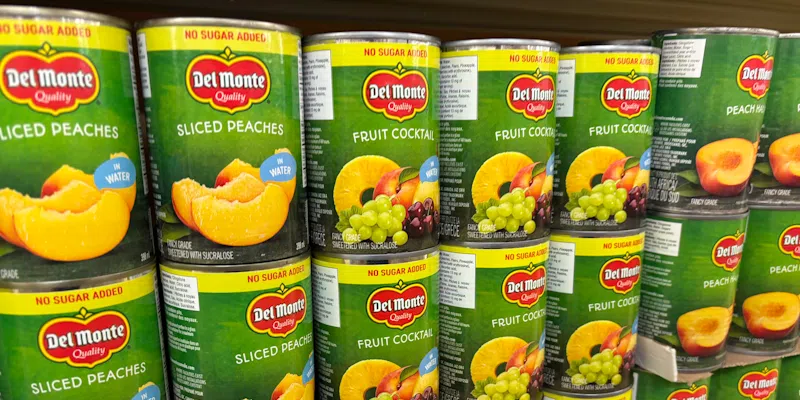After nearly 140 years of feeding American families, Del Monte Foods has filed for Chapter 11 bankruptcy protection. Known for its iconic canned fruits and vegetables, the company is now facing a financial crisis with debt estimated between $1 billion and $10 billion. Del Monte bankruptcy marks a dramatic shift for a brand that was once a staple in nearly every U.S. household.
Del Monte Bankruptcy- What Happened?
The downfall of Del Monte didn’t happen overnight—it’s been brewing for years. The core issue? A massive change in consumer behavior. Today’s shoppers are gravitating toward fresh, organic, and preservative-free foods. Classic canned goods, once a kitchen essential, have fallen out of favor. Simply put, Americans aren’t buying canned peaches and green beans like they used to.
This change in demand left Del Monte with mounting unsold inventory, which costs money to store. To move products, the company often had to slash prices, cutting further into profits. It was a losing cycle—fewer buyers, more storage costs, lower profits.
Economic Pressures and Trade Tariffs
The broader economy added fuel to the fire. With grocery prices climbing, consumers started seeking cheaper alternatives. That hit Del Monte’s already shrinking customer base hard.
Then came trade tariffs. A 50% tariff on imported steel made it significantly more expensive to manufacture the metal cans Del Monte relies on. That seemingly unrelated policy had a domino effect on the company’s production costs.

Debt Trouble and Legal Setbacks
Del Monte didn’t just have sales problems—it also had financial ones. The company was engaged in high-stakes debt restructuring to try and free up cash, but it backfired. A group of lenders sued, claiming Del Monte defaulted on a $700 million financing deal. Although the lawsuit was recently settled, it saddled the company with millions more in annual interest payments—money it couldn’t afford to lose.
Not All Bad News
Del Monte isn’t just about canned peaches. It also owns brands like Contadina Tomatoes, College Inn and Kitchen Basics broths, and the up-and-coming Joya Bubble Tea. Some of these newer lines actually saw growth. Unfortunately, their success wasn’t enough to offset the steep decline in the canned food business.

Chapter 11: A Reset, Not a Shutdown
Del Monte Bankruptcy – Filing for Chapter 11 doesn’t mean the end of Del Monte. Consider it a financial reset—a court-monitored process to reorganize debt and seek a new buyer. Del Monte is actively looking to sell the business while keeping operations running. To stay afloat during this process, the company has secured a $910 million emergency loan, including $160 million in fresh capital.
Del Monte says grocery store shelves won’t go empty. Operations will continue, vendors will be paid, and factories will stay open—pending court approval. For now, the canned corn and fruit you’re used to will still be available.
Who Else Is Affected?
Del Monte bankruptcy is sending shockwaves through its supply chain, with companies like Uber Freight, Saddle Creek Logistics, and CH USA owed millions for transportation and storage services. Many of these debts are unsecured, meaning repayment isn’t guaranteed and depends heavily on how the bankruptcy proceedings unfold.
Despite the risk, Uber Freight has expressed support, saying it expects to be paid in full for both old and new services.
The Bigger Picture
Del Monte CEO Greg Longstreet is presenting the bankruptcy as a strategic step aimed at rebuilding the company for a stronger, more resilient future. He’s emphasizing the company’s mission to nourish families and expressing gratitude for the ongoing support of employees, growers, and customers.
But the deeper message here is about change. Even a legacy brand like Del Monte isn’t immune to shifting market dynamics. Consumer preferences evolve, economies fluctuate, and companies—no matter how iconic—must evolve or risk becoming irrelevant.
Closing Remarks
Del Monte’s Chapter 11 filing is a warning sign for legacy brands everywhere: adapt or fall behind. As more consumers move toward health-conscious, fresh food options, companies rooted in older models must innovate quickly or face the same fate.
While Del Monte isn’t shutting down yet, the road ahead will be tough. But with a restructured financial plan and the right buyer, it just might survive—and reinvent itself for the modern consumer.
Follow UState Pulse News for sharp reporting on how changing consumer habits are rewriting the rules for big-name brands.